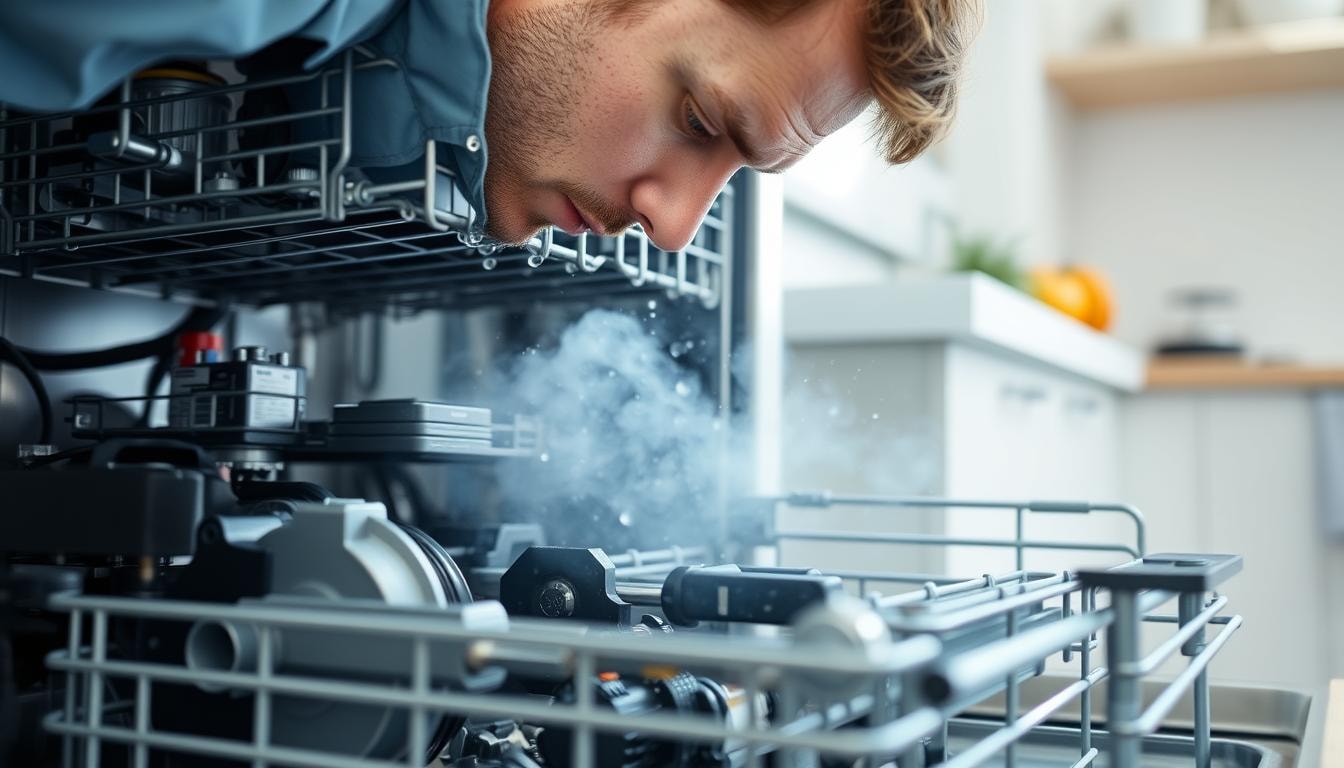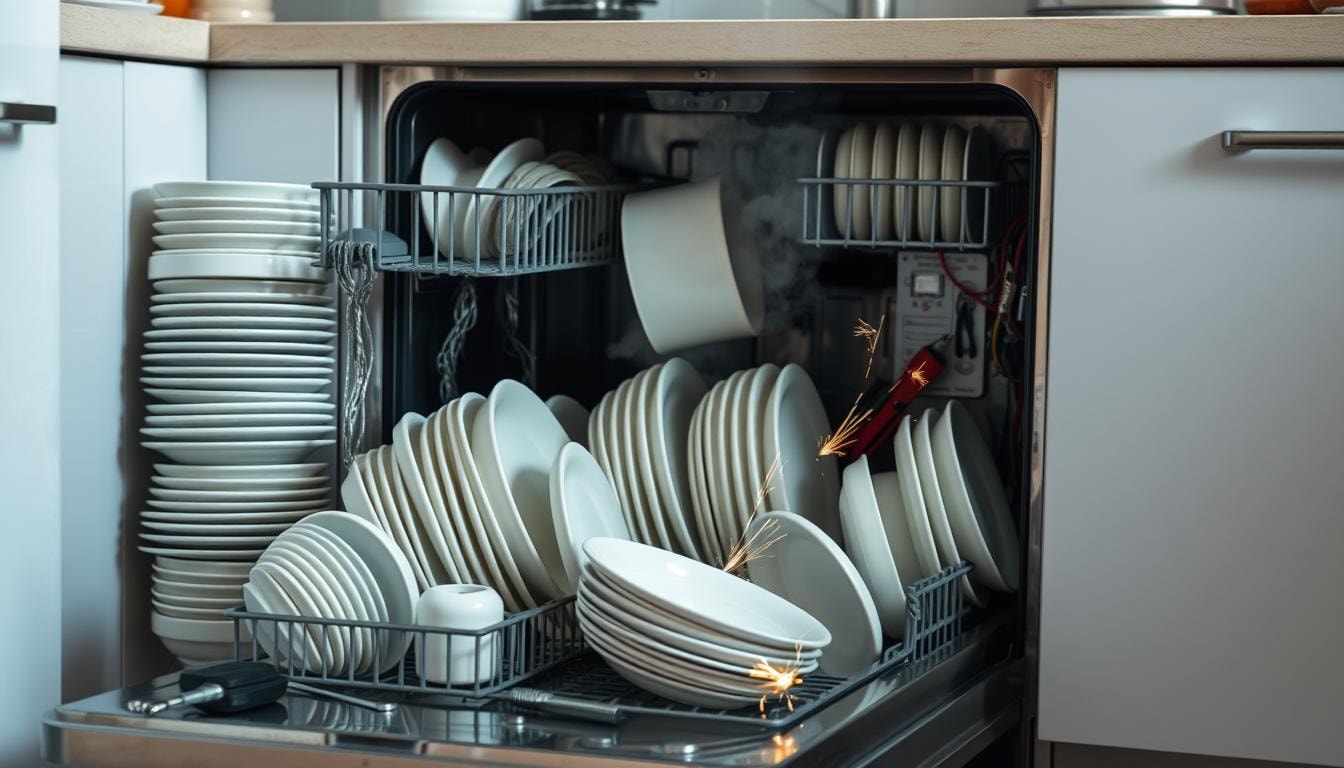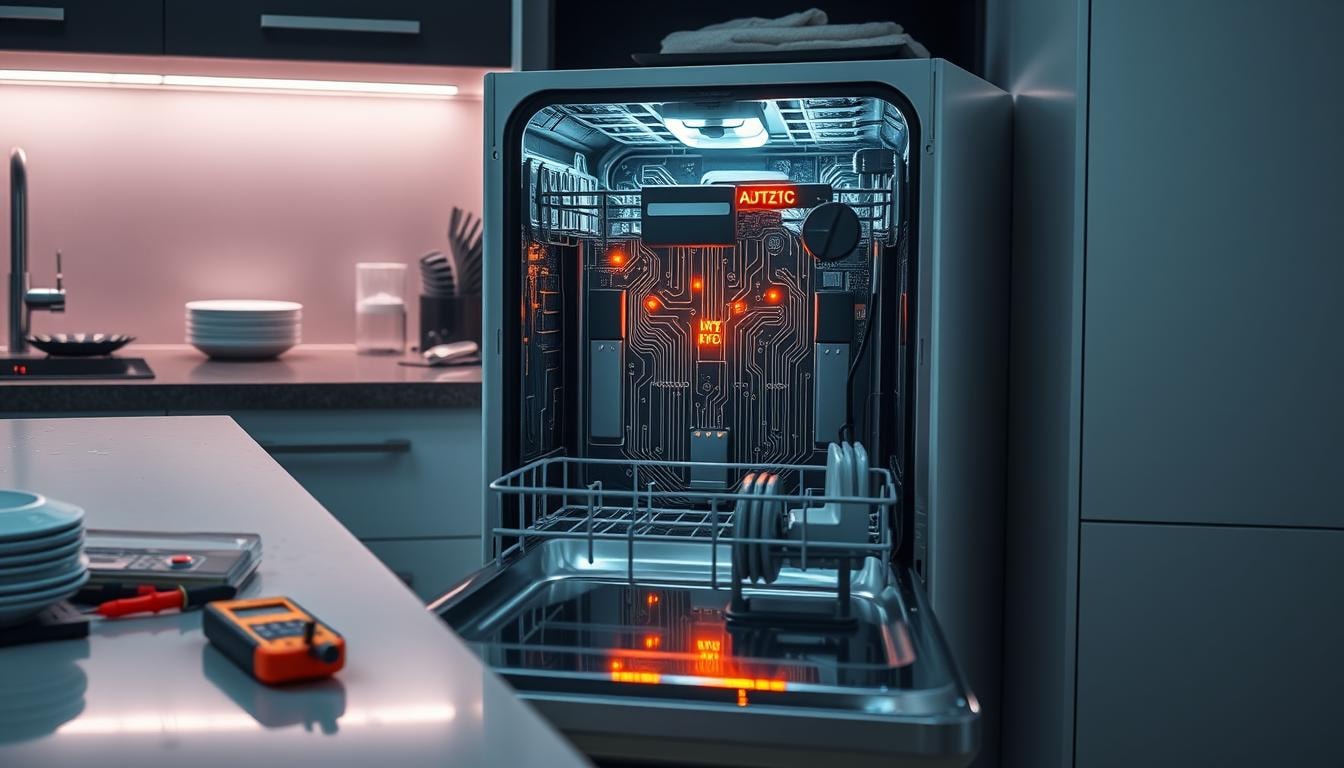Dishwasher Repair Near You
Can’t find what you are looking for?
How It Works
-
Answer a few questions about your home project.
-
Within seconds, get matched with top-rated local pros.
-
Compare quotes and choose the best pro for the job.
Dishwasher Repair In Your Area
Need Dishwasher Repair? Here’s What to Expect
Meta Description: Experiencing dishwasher issues? Learn about common problems, repair costs, and when to call a professional for dishwasher repair. Get your appliance back in working order.
Is your dishwasher leaving dishes spotty and dirty? Maybe it’s leaking water onto your kitchen floor. Common dishwasher problems need quick fixes to avoid more damage.
A clean, efficient kitchen depends on a working dishwasher. This guide will help you spot signs of trouble and find solutions.
We’ll cover common issues and steps to get your appliance working again. You’ll learn when to DIY and when to call a pro.

Key Takeaways
- Identify common dishwasher issues like spotty dishes, water leaks, and heating problems.
- Diagnose and troubleshoot problems using manufacturer guidelines and DIY repair techniques.
- Understand when it’s best to repair versus replace an aging or heavily damaged dishwasher.
- Learn essential dishwasher maintenance tips to extend the life of your appliance.
- Find qualified local repair services to handle complex or high-risk dishwasher repairs.
Signs Your Dishwasher Needs Repair
Keep an eye on your dishwasher’s performance to catch issues early. Watch for spotty dishes, inefficient cleaning, and water leaks. These signs may indicate your appliance needs repair.
Spotty or Dirty Dishes
Dishes coming out spotty or dirty after a full cycle suggest a problem. Blocked drain screens or filters can hinder water circulation. This leads to poor cleaning results.
Older, Inefficient Model
Older dishwashers may struggle to clean dishes thoroughly. They’re more prone to leaks, cracked interiors, and standing water. Consider upgrading to an Energy Star-rated model for better efficiency.
Water Leaks
Visible leaks around the door point to gasket or latch issues. Leaks can cause water damage if not fixed quickly. Address this problem promptly to avoid further complications.
Dishes Not Hot After Cycle
Cool dishes after a wash cycle may indicate heating element problems. This can affect the cleaning process. Check the water supply if dishes aren’t hot after washing.
Cracks in the Interior
Look for cracks in the tub or racks. These can allow water to leak. Fixing interior damage early prevents more serious issues later on.
Standing Water in the Tub
Water in the tub after a cycle suggests drainage issues. This could be due to a clogged drain or pump failure. Address this problem to prevent water accumulation.
Recognize these signs to tackle dishwasher problems early. Quick action can extend your appliance’s life. Regular maintenance helps avoid costly repairs down the road.

Diagnosing Dishwasher Problems
Is your dishwasher acting up? Start by figuring out what’s wrong. Use the diagnostic mode, check the manual, or call customer service. These steps can help you find the issue quickly.
Using Diagnostic Modes
Many new dishwashers have self-diagnostic features. These can give you helpful tips or error codes. Use them to identify what’s wrong with your appliance.
Checking Product Manuals
Your dishwasher’s manual is full of useful info. It tells you how to use, care for, and fix your appliance. Read it carefully to find answers to your problems.
Contacting Customer Service
Still stumped? Call the manufacturer’s customer service team. They know their products inside and out. They can guide you through troubleshooting and diagnosing issues.

DIY Dishwasher Repairs
You can fix some common dishwasher problems yourself and save money. Simple repairs include replacing worn door gaskets, adjusting door latches, and replacing faulty door switches. These DIY fixes are easier than you might think.
Replacing Door Gaskets
A damaged door gasket can cause water leaks and drainage issues. To fix this, remove the old gasket and install a new one. This simple repair can boost your dishwasher’s efficiency and prevent water damage.
Servicing Door Latches
A faulty door latch can stop your dishwasher from starting. You can fix this by adjusting or replacing worn parts. This repair ensures your dishwasher works properly again.
Servicing Door Switches
The door switch starts the cleaning cycle when the door is closed. A broken switch can stop your dishwasher from running. Testing and replacing the door switch is an easy fix.
These DIY repairs are doable for most homeowners. They include fixing door gaskets, door latches, and door switches. However, leave complex issues to trained service technicians.
Factors in Repairing vs. Replacing
Is your dishwasher acting up? You might be wondering whether to fix it or buy a new one. This choice can greatly affect your budget, so consider these key factors carefully.
Age of the Appliance
Your dishwasher’s age is crucial. Older models usually last 9 to 15 years. Repairs might not be worth it if they cost almost as much as a new one.
A newer, Energy Star certified dishwasher can save you money on utility bills in the long run.
Cost of Repairs
The average dishwasher repair cost ranges from to 0. Minor fixes like replacing a water inlet valve or door latch may cost under 0.
More complex repairs, such as a control board or pump assembly replacement, can cost around 0. Compare repair costs to new dishwasher prices before deciding.
Availability of Parts
Consider the availability of replacement parts. If parts are hard to find or no longer made, replacing the whole unit might be smarter.
By looking at your dishwasher’s age, repair costs, and parts availability, you can make a smart choice. Sometimes, a new, efficient model is the better long-term option.
Common Dishwasher Issues
Dishwashers can face various problems in households. These include valve, heating element, timer, control switch, and float switch issues. Understanding these problems helps in troubleshooting and fixing them.
Valve or Heating Element Problems
A faulty water inlet valve can prevent proper filling. A broken heating element may not heat water enough. Both issues lead to poor cleaning performance.
If your dishwasher isn’t filling or heating water, check these components. They could be the source of the problem.
Timer and Control Switches
Faulty timers or control switches can stop dishwashers from starting. They may also prevent full cleaning cycles. Fixing these electrical parts is key to resolving operation issues.
Float Switch Malfunctions
The float switch controls water levels in dishwashers. A broken switch can cause over-filling and leaks. Fixing float switch problems prevents water damage in your kitchen.
Pinpointing the issue is crucial for fixing dishwasher problems. Understanding these common malfunctions helps homeowners tackle issues effectively. With this knowledge, you can better maintain your dishwasher’s performance.
Maintaining Your Dishwasher
Keep your dishwasher running smoothly with proper maintenance. Regular cleaning and inspection are crucial. Use the right loading techniques and detergents to extend your appliance’s life.
Regular Cleaning and Inspection
Clean your dishwasher monthly to prevent germ buildup and maintain efficiency. Run it weekly to keep motor seals working properly. Use a dishwasher cleaner like Cascade Platinum for optimal performance.
Clean the filter regularly to prevent debris buildup and odors. White vinegar is effective for reducing buildup in your dishwasher.
Proper Loading Techniques
- Follow your owner’s manual for proper dish loading. This impacts cleaning ability and overall performance.
- Clean the dishwasher gasket monthly with water and vinegar. This prevents odors and mold growth.
- Check and clean spinning arms to prevent clogs. This ensures efficient dishwashing and avoids operational issues.
Using Recommended Detergents
Use recommended detergents to prevent mineral buildup and corrosion. Follow these dishwasher care practices to avoid common issues. This helps prevent costly repairs and ensures your appliance serves you well for years.
Hiring a Professional Technician
Can’t fix your dishwasher? Hire a pro. Search for local repair services. Check their qualifications and reviews to ensure you’re working with a reputable company.
Expect a service call fee of to 0. Get an estimate on repair costs before authorizing work. A pro can give you peace of mind and fix your appliance.
Finding Local Repair Services
Look for professional repair services in your area. Check online directories and search engines. Ask friends, neighbors, or colleagues for recommendations on dishwasher repair services.
Checking Qualifications and Reviews
- Find licensed and certified technicians with extensive training who follow industry standards.
- Read online reviews and ratings to assess their reputation and customer satisfaction.
- Request references from recent customers to understand their quality of work.
Understanding Repair Costs
- A service call fee is charged when the technician diagnoses the issue.
- Get a detailed estimate for repair costs, including parts and labor.
- Compare quotes from reputable companies for fair pricing on repair services.
Research and hire a qualified professional technician. They’ll get your dishwasher working again with minimal hassle. Your household will thank you.
Find the Right Dishwasher Repair Experts with FindPros
Are you tired of dealing with dishwasher issues on your own or struggling to find a reliable repair service? Let FindPros help you get the job done right.
Simply answer a few quick questions about your home project, and we’ll match you with top-rated local appliance technicians. You’ll get competitive quotes from multiple pros, so you can choose the one that best fits your needs and budget. No more hand washing dishes or searching for the right brand-specific hoses and channels.
Our vetted professionals are equipped to handle any dishwasher repair, no matter how complex. Their work is also generally covered under warranty for your peace of mind. Get your appliance back up and running in no time with the help of FindPros.
Conclusion
Knowing when your dishwasher needs repair can save you time and money. Regular maintenance through cleaning and proper loading helps prevent breakdowns. This guide helps you decide between DIY fixes and professional dishwasher repair.
Working with an experienced appliance repair professional offers many benefits. They can quickly diagnose and fix problems using genuine parts. Same-day or next-day service minimizes downtime. Warranties and safety protocols provide peace of mind.
Annual maintenance can extend your dishwasher’s lifespan. It helps avoid costly damages in the future. Taking care of issues early is key to keeping your appliance running smoothly.
You can now take steps to troubleshoot and maintain your dishwasher effectively. This guide has given you the tools to keep it working well. Whether you choose DIY or professional service, you’re prepared to handle dishwasher issues.
Frequently Asked Questions (Dishwasher Repair)
MOST POPULAR CITIES
Browse by State- Alameda
- Costa Mesa
- Laguna Beach
- Orange
- Alhambra
- Culver City
- Lancaster
- Oroville
- Anaheim
- Daly City
- Livermore
- Oxnard
- Antioch
- Davis
- Lodi
- Pacific Grove
- Arcadia
- Downey
- Lompoc
- Palm Springs
- Bakersfield
- El Centro
- Long Beach
- Palmdale
- Barstow
- El Cerrito
- Los Angeles
- Palo Alto
- Belmont
- El Monte
- Malibu
- Pasadena
- Berkeley
- Escondido
- Martinez
- Petaluma
- Beverly Hills
- Eureka
- Marysville
- Pomona
- Brea
- Fairfield
- Menlo Park
- Port Hueneme
- Buena Park
- Fontana
- Merced
- Rancho Cucamonga
- Burbank
- Fremont
- Modesto
- Red Bluff
- Calexico
- Fresno
- Monterey
- Redding
- Calistoga
- Fullerton
- Mountain View
- Redlands
- Carlsbad
- Garden Grove
- Napa
- Redondo Beach
- Carmel
- Glendale
- Needles
- Redwood City
- Chico
- Hayward
- Newport Beach
- Richmond
- Chula Vista
- Hollywood
- Norwalk
- Riverside
- Claremont
- Huntington Beach
- Novato
- Roseville
- Compton
- Indio
- Oakland
- Sacramento
- Concord
- Inglewood
- Oceanside
- Salinas
- Corona
- Irvine
- Ojai
- San Bernardino
- Coronado
- La Habra
- Ontario
- San Clemente